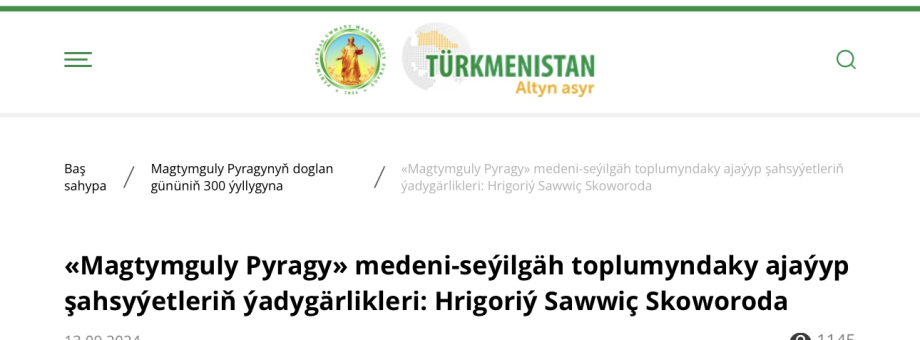THE NEWSPAPER "TURKMENISTAN: GOLDEN AGE" INTRODUCES READERS TO THE BIOGRAPHY OF THE OUTSTANDING UKRAINIAN PHILOSOPHER GRIGORIY SKOVORODA

The electronic state newspaper "Turkmenistan: Golden age" publishes a series of articles about outstanding personalities of foreign countries, whose monuments are installed on the territory of the cultural and park complex "Magtymguly Pyragy" in Ashgabat, opened in the anniversary year in honor of the 300th anniversary of the Turkmen poet and thinker Magtymguly Fragi.
The last article on the website of the publication is dedicated to the personality of the outstanding Ukrainian philosopher and educator Grigoriy Skovoroda.
The opening of the monument to the Ukrainian philosopher on the alley of famous poets and thinkers of different countries and eras in the capital's cultural and park complex "Magtymguly Pyragy" in May of this year is a symbol of the growing cultural and humanitarian ties between the two friendly countries.
The article in the Turkmen language introduces readers to the biography of the outstanding philosopher, theologian, poet, teacher, translator, musician Grigoriy Skovoroda, who was among the famous thinkers of the 18th century, the Age of Enlightenment, who showed people moral ideals, helped them to comprehend the truth through self-knowledge. People call him "Ukrainian Socrates".
Hrigoriy Savvich Skovoroda was born on December 3 (November 22, old style) 1722 in the village of Chornukhi, Poltava region, in the family of a land-poor Cossack. From an early age, he was distinguished by a tendency to concentrate in his inner world, fortitude, and a great desire for science and knowledge. He grew up and was brought up among the villagers, in a typical Ukrainian family, on the basis of folk honesty and the norms of Christian morality and ethics, which always turned to the inner world of a person, taught to live on the basis of love and kindness. Family and his native school played an outstanding role in Hrigoriy’s upbringing.
During 1734-1753, he received a thorough knowledge of the humanities at the Kyiv-Mohyla Academy, although he did not complete the full academic course. In 1742–1744 was a choir singer and received a good, at that time, musical education. In 1744, having returned to Kyiv, he resumed his studies at the Kyiv-Mohyla Academy in the philosophy class. And already in 1745 he went to Hungary, worked in the “Tokaj Commission for the procurement of wines for the royal court.” Traveling through European countries, H. Skovoroda improved his knowledge and was interested in folk life, customs, art, and beliefs. And all this was subsequently reflected in his works.
Having received additional education abroad, he taught in Ukraine and began to introduce innovative ideas into the educational process. Striving to promote science in the spirit of humanism and enlightenment, the innovative teacher gained popularity due to his talent, oratorical abilities, knowledge of languages and the mind of a scientist. While teaching literature, syntax, and Greek at the Kharkov Collegium, H. Skovoroda became interested in ancient literature. Then he began to write “Fables of Kharkov”. Subsequently, leaving work at the Kharkov Collegium, he traveled for the last 25 years of his life and led an ascetic lifestyle until his death.
Hrigoriy Skovoroda died on November 9, 1794 in the village of Pan-Ivanovka (now Skovorodynovka) in the Kharkov region.
Most of Skovoroda's works have survived to this day. The entire creative heritage of Grigory Skovoroda, which includes 18 philosophical works, 7 translations, the collection “The Garden of Divine Songs”, “Kharkov Fables”, tales, parables, songs, poems, letters, is a single system of views, a single philosophy.
The 300th anniversary of Hrigoriy Skovoroda, as well as the 300th anniversary of Magtymguly Fragi, was included in the UNESCO calendar of memorable dates in 2022–2023.
Despite their belonging to different cultural paradigms, the work of Hrigoriy Skovoroda and his contemporary, the outstanding Turkmen poet and thinker Magtymguly Fragi, has a number of common features.


 NEWS
NEWS